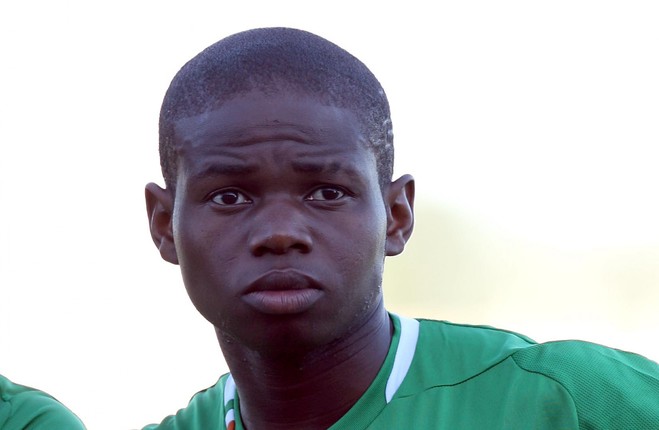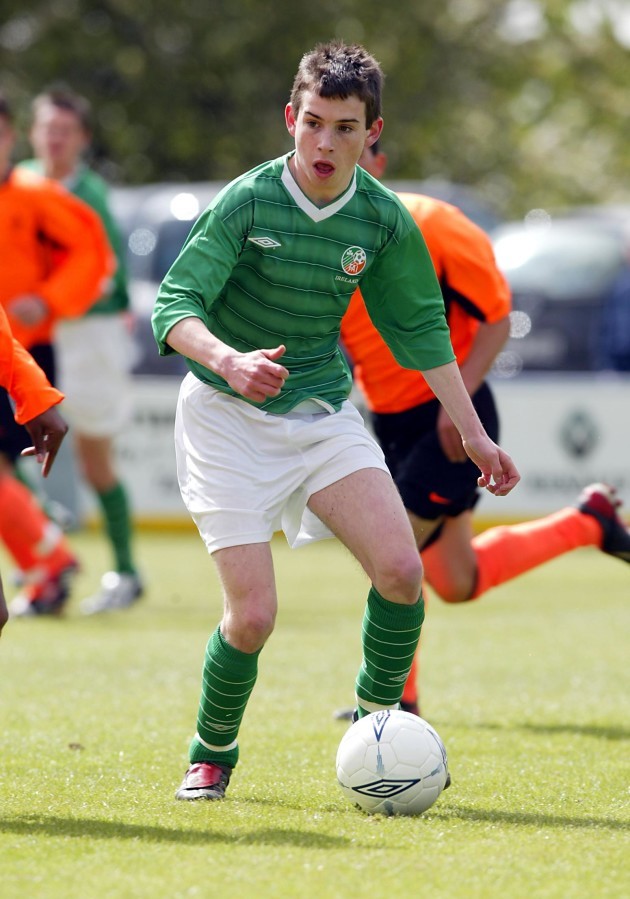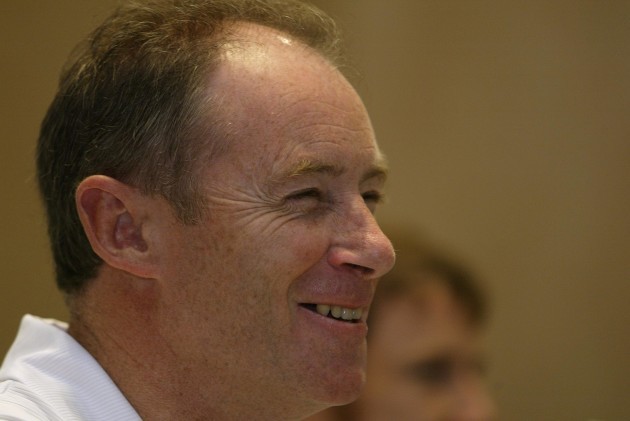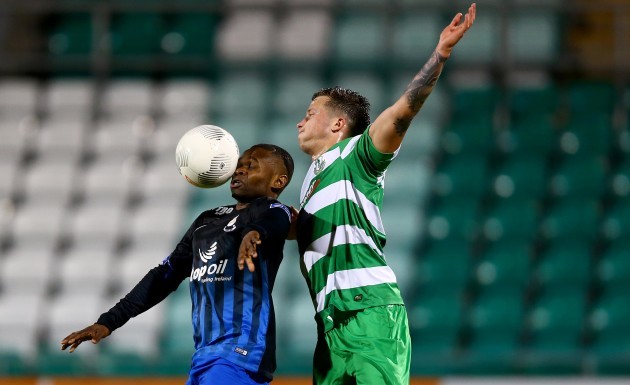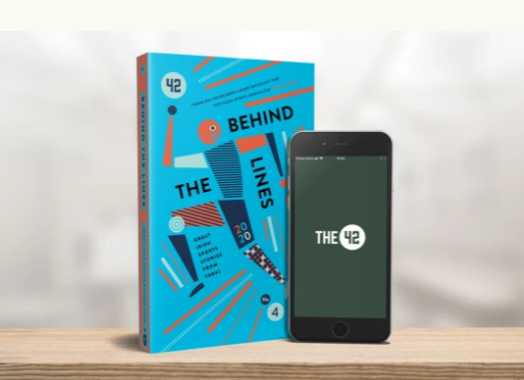IT IS JUST over 17 years since Emeka Onwubiko made his Ireland underage debut for Vinny Butler’s U15s side.
It was a historic occasion, with Onwubiko becoming the first-ever Nigerian to represent Ireland in football.
Now 31, the former player says he didn’t appreciate the significance of the moment at the time.
“I was a kid,” he tells The42. “Football was my freedom.
“I wasn’t aware of what was going on and the impact of it. I didn’t even think playing for Ireland was a big deal. I just thought it was another game. I remember all my friends and my little cousins going ‘jeez, this is crazy, seeing you on telly’. But I wasn’t conscious of whatever I was doing.”
At the time, it was hoped Onwubiko would eventually go on to play at senior level for Ireland and continue to inspire a generation of Irish-Nigerian footballers.
However, football, like life, is seldom straightforward, and a senior cap ultimately eluded the gifted young player.
****
Onwubiko was around 11 when he moved to Dublin with his family in 2000, around a time where there was a substantial increase in the number of Nigerian people living in Ireland. And according to figures provided by the Central Statistics Office following the most recent census in 2016, at that time, there were 6,995 Irish-Nigerians and 6,084 Nigerian-born people considered residents in Ireland.
“[The early 2000s] is when most African communities moved to Ireland,” Onwubiko says. “That’s why you’re seeing this emergence of kids with a Nigerian background playing for Ireland in the underage system. Everything all started 20 years ago. There was a big influx. It’s only going to get bigger now. Over the next 20 years, you’re going to see even more of an evolution with the impact it can make.”
By contrast, growing up in Swords, Onwubiko initially was the only black person in his school. Kids would touch his hair “like I was an alien”.
“[Racism is] still going on now, but it’s different. It’s more subtle,” he says.
On his experiences of racism growing up, he adds: “‘Go back to your country you black c**t,’ I’ve had loads of that in football. They say something and then you say something. But I forgive people if they make mistakes because of ignorance or not knowing, that’s fine, you can correct that. But it’s only when there’s hatred, then I’ll be like: ‘Right, we have an issue here.’
“But I find that those people that are saying [racist comments] are probably not educated, because they haven’t been to a different country before. All they know is the Irish people. So I can understand the ignorance.”
Onwubiko learned football playing on the streets of Nigeria and was struck by how less commonplace these type of casual games were when he arrived in Ireland.
His talent for the sport quickly became apparent. He lined out for St Joseph’s Boys and St Kevin’s among others. After scoring 12 goals in six games with the latter during an U13 tournament in Liverpool, news of Onwubiko’s talents began to reach a wider audience.
He started earning call-ups to Irish underage squads and Manchester City became interested in signing him.
Unfortunately though, it never materialised. He went over to City with fellow Kevin’s graduate Karl Moore, who ended up signing terms with the Etihad outfit and now plays for Shelbourne.
Onwubiko too had agreed a four-year deal.
“I did the photos, the tours, they announced me at half-time [of a game], when they were announcing new players that signed.”
Yet unbeknownst to City, despite being able to appear for Ireland in non-competitive matches, Onwubiko did not have an Irish passport. That factor ended up scuppering his dream Premier League move.
“I had a similar situation with West Brom. I was living over there for six months. I was thinking the passport would come and it never came. But listen, it’s just the way it’s supposed to be. I tell people I was at Man City and West Brom and they’re like: ‘Well, it’s not on Google, is it?’ Some people forever want to take that away from you.
“If my cap wasn’t viewable or there weren’t pictures, people would say I’d never [played for Ireland].
“A lot of people at my school were excited [at the time]. Even at St Kevin’s, it was a big deal, because they hadn’t had anyone doing that in a while. A lot of African kids that play for Kevin’s figure it out and say ‘your name is on the wall in the clubhouse’ of international players that played for Kevin’s. So a lot of them want to put their names on the wall and I know a lot of them will do, because of the production at St Kevin’s.
“It’s great to see that they’re looking up to me. But I didn’t know I was impacting anybody. I didn’t mean to be inspiring or motivational. It was just me.”
Belatedly, Onwubiko received an Irish passport, with the help of the organisation Sport Against Racism in Ireland and Brian Kerr.
“They were crucial for me getting a passport. I was supposed to go to a Belgian team, Standard Liege, and that didn’t happen because of the passport. That’s when Brian Kerr found me, all that stepped up, and I got it.”
Onwubiko agrees when it’s put to him that the delay and uncertainty with the passport hampered his development, adding: “We all need a bit of luck along the way, no matter what you do, it’s just being in the right place at the right time.”
However, he refuses to view himself as a hard-luck story.
“I look at it like whatever way my life is, it’s just the way it’s supposed to be.
“Maybe, if I had all that success, I could have become a not-nice person. I’d be working with some kids, a lot of them are around Bray, and because I was playing with Bray Wanderers, they expected me to be different or act different. But I’m just very humble and chatty, because life has humbled me.
“And I’m quite a strong person. My parents are always saying, ‘things are not going well for you, but you’re still positive. How are you doing that?’ Every time I go to see them, they’re like: ‘What’s going on?’
“Not everyone has that positivity and that ability to understand everything will be okay.”
Instead of the glitz and glamour of the Premier League, Onwubiko initially spent time playing for Bray and Athlone Town. He then earned a move to Celta Vigo, though he couldn’t break into the La Liga side’s first team and spent more time in England playing non-league football.
A return to Ireland followed, amid spells with Shamrock Rovers’ B team, Bray and Athlone (both for a second time), but his career then fizzled out before he had turned 30.
The final straw was when Athlone were unable to pay their players in 2016.
“I was relying on football for money,” he says. “I was relying on football so much, it was terrible. When I’m coaching kids now and I’m trying to advise them, I say ‘don’t make the same mistakes I did’. You’re losing passion and motivation, maybe my standard wasn’t high enough. It was about trying to get past that, though I was a bit peed off. I didn’t have the positivity to keep myself going. So I decided, I don’t want to be relying on this, I need to start making a living.
“I don’t want to be working game by game for €10 an hour or something like that. But that was my life.
“My parents would always laugh at me: ‘You may have done this, but you’ve nothing [financially] to show for it.’ So you could say that Ireland doesn’t offer athletes financial freedom, up to today. If you’re playing in Ireland, you need to make sure your transition starts early.”
****
Having finished playing, Onwubiko is now focusing on a coaching career, and he hopes to help people learn from his own setbacks as a player.
“I came here [to Ireland] and I was quite unique. I had a lot of flair. I did a lot of stepovers. I ran at players. I was very quick.
“So that’s why my rise was quite rapid. I wasn’t just a player that got it, and passed it. In Ireland, passing and pinging the ball is in the culture. There are not a lot of exciting players. Only after a few years, when I started copying my friends, I became more ‘Irish’, and I lost my confidence. You need to improve your strengths, rather than working on your weaknesses. We have to be emphasising what players are capable of, rather than going: ‘Let’s work on your weaknesses.’”
He says that incorporating more people with an African background, whether that is in relation to the playing or coaching side of the game, can only help Irish football.
“Ireland is a very safe country. Everything we do is quite safe. So if you start acting like you’re ambitious or passionate about something, they start [dissuading you]. There’s no ‘I want to see what’s on the other side of the world.’ People are quite content just being ‘okay’. This culture, it transfers to the coaches and the players.
“Say with the African community, you’ve got to be able to dance, you’ve got to express yourself, you’ve got to wear colourful stuff. That culture sometimes integrates into football, because you’re free. Even though sometimes you don’t have money or whatever, you’re always singing or dancing in the house. Most kids now that have a background of growing up in Ireland, even myself, have a balance of both, which helps.
“Being safe can help you in some ways and being able to push yourself to be courageous, it can also help you to achieve more.
“When you’re courageous, you have way more chance of playing. If you are not afraid to fail, then happy days. The biggest issue for me and a lot of people is what other people say. We’re always listening to people’s opinions. I feel like it’s gotten to our players where everything we do is quite safe. My understanding of coaching is quite different. I have a conscious bias, I want players to attack their fear. If someone is in front of you, take the player on.
“I think football shows you what life is like when you grow up. Going through your fears, winning games and losing games, falling and failing. If you just think about it like that, you’ll be more successful, rather than thinking about it as just football.
“So the cultures are different and it can help the national team. England have a lot of black players, as do Germany and France. Variety is important if you want to make a nice dish. The coaching needs not just an Irish mentality, you need a coach with other ideas. You need to be open and let people try things.”
Onwubiko now coaches part-time at the Bray Institute of Further Education, while he has also set up the Modern Legacy Academy. The latter decision was prompted by his frustrations with what he saw as the rigid way that other Irish coaches taught the game and believes his background playing football in England and Spain has given him a different perspective.
“In Ireland, you’re kind of dealing with people who have limited experience. A lot of people that run the clubs haven’t experienced anything different. They’re just coaching the way they’ve been coached. They have their badges and think they’re better than you, just because they have the badges. But they’ve only been in Ireland, they’ve never been in other cultures, experiencing things and realising that there’s something different.”
Onwubiko dreams of coaching at an elite level one day, but acknowledges such opportunities are scarce.
“My parents are always laughing at me. I always tell them I want to go into sport and they always tell me to work, get that education, get that paid job, get that money coming in, get that financial freedom, but I still believe it is possible for me to get that financial freedom through sport.
“Unfortunately, Ireland doesn’t give you that. Whatever I achieve in Ireland, I’m not going to have financial freedom, except if you get a job in the FAI or a club that pays you quite well, what you deserve.”
****
Just over 15years ago i made history as the first Nigerian kid to wear the Irish Jersey, 15 years later a huge crop of Nigerian kids nw wearing the Irish Jersey.
— Emeka Onwubiko (@MeeksEmeka1611) January 12, 2021
Makes me a proud older brother.
Message to next generation of Nigerian kids following the same path is be strong🙏💪 pic.twitter.com/v0vyj4SXax
Onwubiko recently saw his tweet go viral, after expressing support for current Ireland underage international Jonathan Afolabi.
Afolabi was born in Dublin to Nigerian parents. He currently plays for Dundee, on loan from Celtic, and was racially abused online after scoring an important goal for his side.
While this vile incident served as a reminder that there is a long way to go, Onwubiko is encouraged by the recent progress made by Irish-Nigerian footballers such as Afolabi, Southampton youngster Michael Obafemi and West Ham teenage starlet Mipo Odubeko.
“20 years on [from my arrival], the progress is quite good. It’s only going to get better.
“It’s going to make Ireland more driven. If I’m coming in and trying to take your position, it’s like: ‘Right, let’s go. I’m going to step up my game.’
“You should embrace it. I embrace it when I see someone that’s a better coach than me. I’m like: ‘Right, that’s where I need to be, so I’m going to step it up.”
On the racist abuse that Afloabi and many others have received online recently, he adds: “I think people are using this social media platform for their boredom, anxiety or depression and taking it out on someone else.
“Just sitting at home, you’re not motivated, not out there playing football or doing whatever, you’re pissed off. So some of those kids that abused Afolabi are pissed off that he’s successful, and they’re finding a way to put him down. When I got the most racist abuse in Ireland, it was when I was successful. It’s only when you start getting successful that you get people coming out, trying to use different ways to maybe bring you back down to their level.
“If a Nigerian kid is in Ireland and thinking they’re never going to get racist abuse in the game, then they’re mistaken, because you can’t control that. I say to people, only worry about things you can control — control the controllables.
“So it is what it is. I just hope these kids are going to be influential to the rise of Irish football and Irish society in general.”
You can find out more about Emeka Onwubiko’s Modern Legacy Coaching Academy here.
